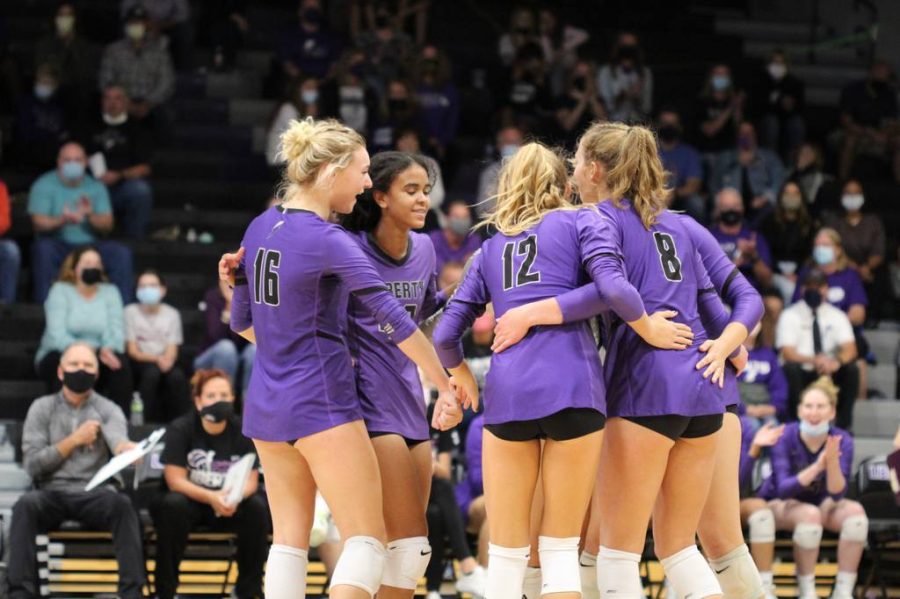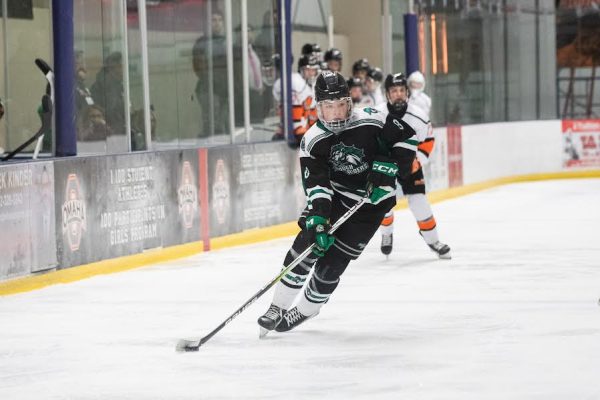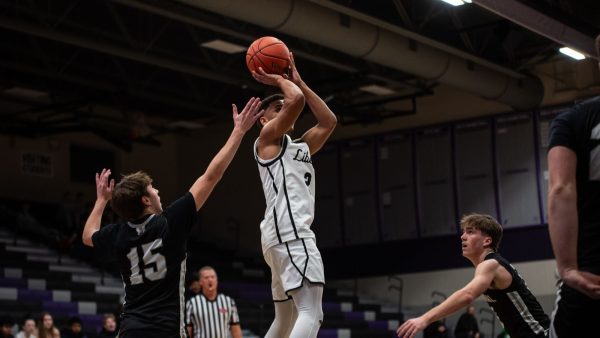High School Athletics: Friend Or Foe?
High school athletics are supposed to be a fun extracurricular, but what do you do when the pressure gets too much?
The girls volleyball team celebrates together after scoring a point.
The sadness and anger has never stemmed from a feeling of letting others down, it comes from a feeling that I could’ve done more. I should’ve done that, I should’ve known better than to do that, or I should’ve taken advantage of that situation. Picture this: an entire sports arena filled with fans watching a weekend basketball tournament. It’s loud and the whistles are shrieking. Everyone has an opinion on the refereeing of each of the 16 games taking place in the arena. Coaches are shouting and directing their players. Parents are shouting at their kids and giving feedback to the referees. You might be imagining a high school event, maybe even a semi-professional event. Now envision that the players are seven-year-olds in first and second grade.
This is a relatively new development. Gen-Z was the first generation to experience this level of sports competition at such young ages. In 1995, the Aumateur Athletic Union (AAU) offered about 100 different national championships to those ages 8 and up. 20 years ago, elementary school students were joining recreational sports teams. Now, when they join sports they often must partake in highly competitive environments, the opposite of “recreational.”
“As a small child I started in competitive cheerleading. I think it was an awful decision as I was 8 and being treated like an 18 year old and expected to perform perfectly,” said Elizabeth Jaeger, recent graduate.
This exemplifies the issue. Young children are not equipped to handle the same pressure as those aged 18.
“I started playing club volleyball in third grade. Seventh grade was the first year I branched out to a much higher level club and started traveling many times out of state for tournaments and qualifiers for nationals,” said Asta Hildebrand, sophomore.
Hildebrand, like many others, started playing high level competitive sports at a young age. She has observed her teammates fall out of love with their sports because of pressures at such a young age. However, although many of her friends and teammates struggle with pressures in sports, she considers herself extremely lucky that her parents put her in competitive sports at a young age.
Being in competitive sports at a young age has benefits. It teaches you teamwork and responsibility, improves your physical health, and builds leaders.
“…I think playing sports has taught me how to manage time, and how I have to work harder than others who don’t do sports to stay caught up and still maintain good grades,” said Hildebrand.
However, children throwing up before games, or losing sleep due to the amount of pressure they feel to do well, may signal that maybe kids’ competitive sports are too cutthroat.
Thirty-two percent of high school athletes in the US, 2,560,000 students, are diagnosed with some form of a mental health disorder (Ohio University, 2019). By the age of 13, 70% of kids have dropped out of organized sports. Forty-two percent of high school athletes have or have had an eating disorder (on, 2018). This is a result of an increasing amount of pressure put on young athletes. Many kids have very high expectations for themselves as well. For some kids, sports are everything. To them, their sport is so important in their life, that they can’t stand underperforming. This perfectionism is extremely taxing on high schoolers’ mental health.
“The sadness and anger has never stemmed from a feeling of letting others down, it comes from a feeling that I could’ve done more. I should’ve done that, I should’ve known better than to do that, or I should’ve taken advantage of that situation,” said Ethan Barber, sophomore.
“Track has definitely affected my mental health. Sometimes I can use running as a way to relax and escape but other times it becomes straining. [From] stress and pressure to perform well, to the amount of times I’ve had coaches makes me cry, drama on the team can all take away from the relaxing part of the sport,” said Jaeger.
When asked about experiencing negative pressures stemming from sports, Tate Brunk, senior, said, “…When you get so much pressure that builds up over time, especially in a big game, it can show, and it can happen to literally anyone in the world.” This is a pretty universal statement that came from most of the students.
“I think that all students should get the same opportunity to play sports [because] high school sports [are] about trying new things and participation,” said Jaeger.
That’s what this issue comes down to. Sports should be fun and relaxing for kids, but that is not the case for many people. Students would be happier if sports were more focused on fun. The communities surrounding youth sports need to be more aware of athlete’s mental health and turn the focus of these sports towards enjoyment.

Madelyn is a senior at Liberty. This is her fourth year in Journalism! Madelyn runs cross country and track, and is a member of the speech team. Outside...









